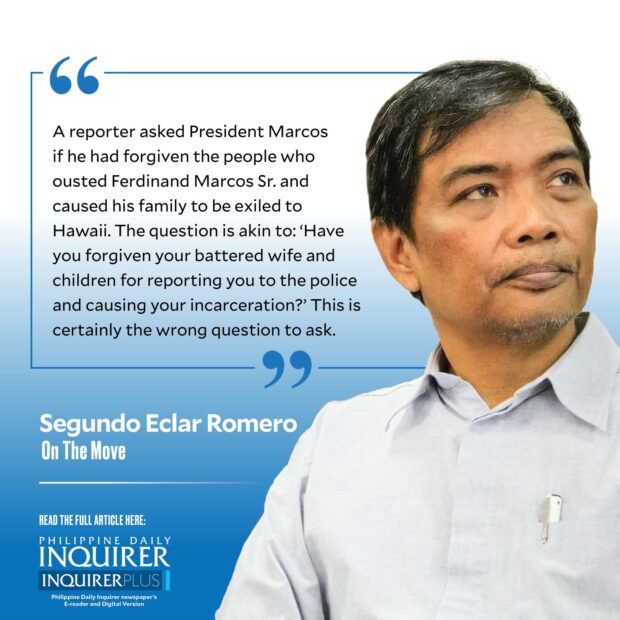
While still on his official visit to the United States last Saturday, a reporter asked President Marcos if he had forgiven the people who ousted Ferdinand Marcos Sr. and caused his family to be exiled to Hawaii. The question is akin to: “Have you forgiven your battered wife and children for reporting you to the police and causing your incarceration?” This is certainly the wrong question to ask.
Imagine, if and when Rodrigo Duterte is arrested and jailed for the human rights abuses and crimes during his mayorship in Davao and term as president by the International Criminal Court, the same question could be asked him: “Do you forgive the families of the victims of the war-on-drug premised human rights abuses and crimes you are jailed for?” Or, more atrociously, “Do you forgive Leila de Lima for investigating the DDS in Davao that triggered the legal spotlight on the DDS crimes in Davao during your mayorship?” We have slid into a “TikTok Democracy” where people are entitled not only to their own opinions but also to their own facts.
Thanks to Leila de Lima, forgiveness has a more profound significance. In her recent interview with Christian Esguerra’s “Facts First,” now a riveting nocturnal social media habit for many, De Lima stated clearly and plainly that she has forgiven all the people that had caused her incarceration on false charges for almost seven years. All, except the former president who she considers the grand instigator and orchestrator of the false charges against her and who must be made accountable.
De Lima’s temporary liberty and strong visual and verbal presence in the stream of Filipino consciousness today are a tipping point in Philippine politics. It is a signal that triggers likely pathways to multiple consequences.
First, it breaks the pall of shock and helplessness that has stultified the political opposition since the Bongbong Marcos-Sara Duterte, and Senate wins during the last elections. It provides the dormant and unguided opposition, led by Leni Robredo, Risa Hontiveros, Antonio Trillanes, and others, to regroup and organize for the 2025 and 2028 elections. It offers the uncommitted, politically inattentive public a way of relating their daily tribulations to issues and ideological positions promoted by political groups and movements seeking political power in upcoming elections.
Second, it reinforces Mr. Marcos’ pushback against Rodrigo Duterte’s campaign to shoehorn his daughter into the presidency in 2028. Duterte seems to rock Mr. Marcos’ boat in the wake of the repudiation of daughter Sara’s claim to confidential and intelligence fund entitlements. It heightens the optics of a discordant father and daughter who cannot seem to get their story straight. Sara seeks the good graces of Mr. Marcos, while her father has gone recklessly to extremes to destabilize the President’s claim to leadership and political stature. Clearly, if she cannot manage her father, she cannot manage her political future.
Third, the international community is provided the opportunity to share its values, standards, and practices of human rights, liberty, and democracy and influence the way the Filipino people build and maintain their institutions and govern their daily lives. The comeuppance of Duterte through the action of the ICC is highly probable. This has been in the works since before Duterte became president, and it will run its course and can no longer be obstructed. Duterte has been openly and rapidly abandoned by his acolytes, except for the likes of Salvador Panelo, Harry Roque, Bato dela Rosa, and Bong Go, who have burned all bridges to redemption and cannot rely on the amnesia of the Filipino people as the refuge of political acrobats and jesters.
The Filipino people find inexorable signals that turn the pages of their political fortunes in the saga of individuals who are martyred by oppressive forces. That is the grand pattern of Filipino history, from Jose Rizal to Andres Bonifacio; Jose Abad Santos, Josefa Llanes Escoda, to Vicente Lim; and Evelio Javier to Ninoy Aquino. De Lima has demonstrated that integrity and principled opposition eventually prevail even in a sluggish democracy. De Lima has, by her steadfast repudiation of the Duterte brand of leadership and justice, earned through her sacrifice a fresh claim to national leadership. De Lima responds to the beat of an inner drum. She’s on her second wind and we await how she will help move this nation.
—————-
doyromero@gmail.com